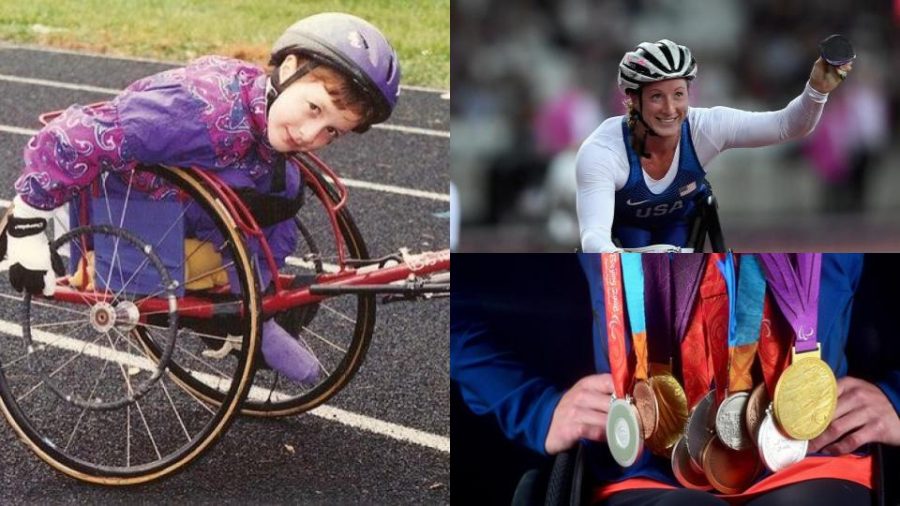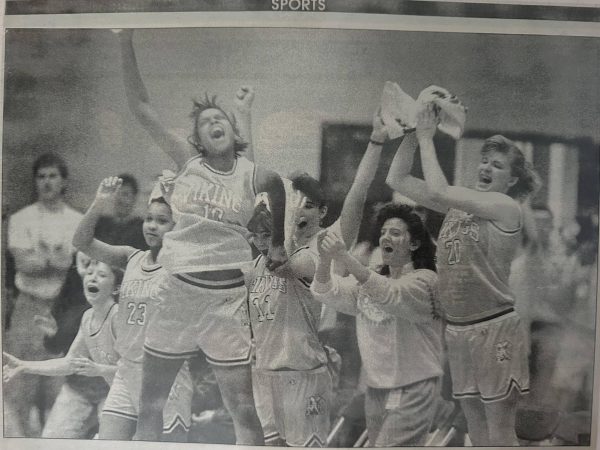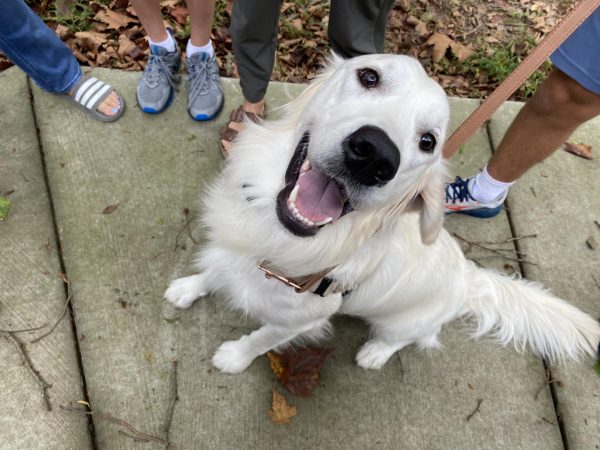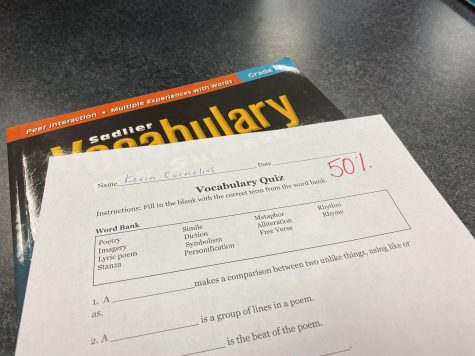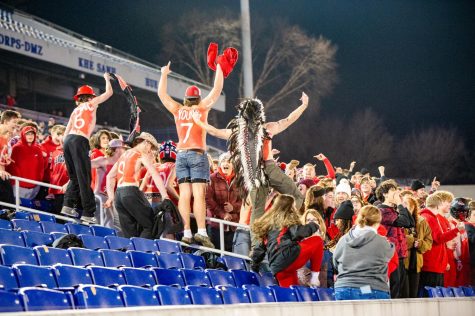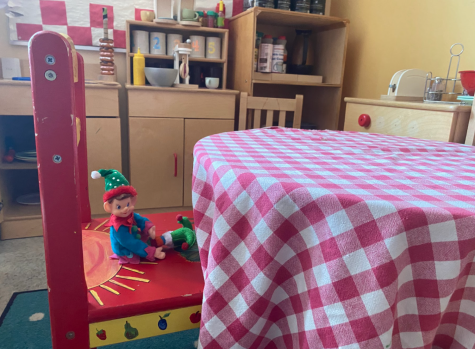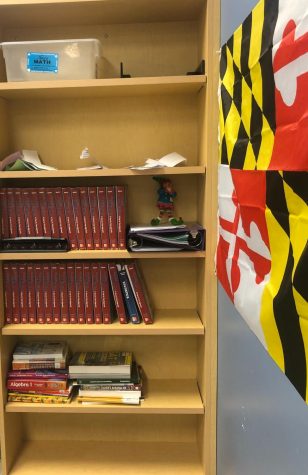Rising Phoenix: How an orphan turned challenge into triumph
Courtesy of the McFadden Family and Getty Images
Young Tatyana McFadden pictured alongside her present-day self. McFadden is considered to be one of the most decorated female wheelchair racer and is now arguably the fastest female wheelchair racer of all time.
“I was over in Russia working, and I was visiting orphanages and saw all these really cute, healthy kids. But there was Tatyana that I saw–she was crawling on the floor and had bright eyes. Interestingly enough, when I went back to my hotel room that night, I couldn’t get her off my mind,” said Debbie McFadden, former U.S. Commissioner of Disabilities and mother of six time Paralympic athlete Tatyana McFadden.
Tatyana felt the same powerful connection.
“Unbeknownst to me, she told everybody in the orphanage ‘That’s my mom.’ I guess it was just meant to be!” said Debbie McFadden.
Tatyana McFadden (@tatyanamcfaddenusa) was born with spina bifida, a birth defect that caused her to be paralyzed from the waist down and was left untreated. Just a few days after she was born, she was orphaned and placed into Orphanage 13 in Saint Petersburg.
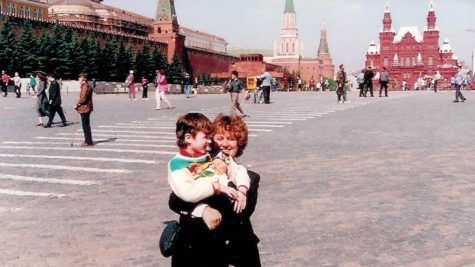
When she came home to Clarksville, Maryland, her parents Bridget and Debbie enrolled her in every sport they could to keep Tatyana healthy and strong. She began wheelchair racing through her local para-sports club (the Bennett Blazers) in Baltimore. Soon, she got good–really good. McFadden went to the Team USA Paralympic trials and made the team for the 2004 Athens Paralympics.
World-class athlete cut from the high school team?
At just fifteen years old, McFadden came home from the Paralympics with one silver and one bronze medal for Team USA. Despite being a Paralympic medalist, McFadden’s high school denied her a spot on their track team and wouldn’t let her compete.
“You know at first, I assumed Tatyana had misunderstood, because anybody can join the track team. It’s not a tryout sport, so why wouldn’t they let her do it? But when she came back and said, ‘No, they wouldn’t,’ I thought there must be some confusion,” said her mother, Debbie. “I went to ask and found out there was no confusion. They just didn’t want somebody who’s different on their track team.”
“We made lots of phone calls to the school. We did all of the right things beforehand; we talked to everyone. The athletic director talked to the coaches on the team. They allowed me to practice, but I was still separate at practice. I was denied a uniform, I went on a separate bus, and was denied at the track meets,” McFadden said. “So, the only option left was to sue,”
The McFaddens sued for no damages: they only wanted Tatyana to be able to participate in the sport with no discrimination. They sued Howard County and the state of Maryland and won both cases. Finally, she was given a uniform and allowed onto the team.
After being granted the ability to compete on the team, the McFaddens worked for two years to pass a state and federal law.
The McFadden family worked jointly with the Obama administration to pass the Sports and Fitness Equity Law, informally referred to as “Tatyana’s Law.”
One of the most decorated female athletes in the world
With the freedom to compete without discrimination, McFadden began her professional career. McFadden was granted a full athletic scholarship to the University of Illinois, and continued to train and compete at various championships and events when she was still in school. While the path to get there was far from easy, McFadden now holds dozens of titles and medals. She is also sponsored by many companies, including Nike, Coca-Cola, and Toyota.
McFadden was born with three strikes against her, but that did not stop her from becoming one of the fastest wheelchair racers and athletes in the world. Since her Team USA debut in 2004 at the Athens Paralympics, she has become one of the most decorated female wheelchair racers in the world with twenty Paralympic medals, and a twenty-four time major marathon winner.
McFadden is also the only athlete in history with consecutive grand slam wins of the London, New York, Boston, and Chicago marathons four years in a row.
“I feel like I can’t really stop…I just love it,” said McFadden.
Winning these events is only one snapshot in time, and many people don’t recognize the hard work that goes into training for a marathon or the Paralympics.
“I would say I do anywhere from one hundred to one hundred and twenty miles a week,” said McFadden.
Her training doesn’t stop there–she also lifts twice a week and works with dumbbells, medicine balls, and does bench presses to keep her shoulders and arms strong.
Once tested by the ESPN Sport Science lab, McFadden’s peak speed is twenty-three miles per hour. With each stroke she gives to her wheelchair’s wheels, she produces enough energy to power ten LED TVs.
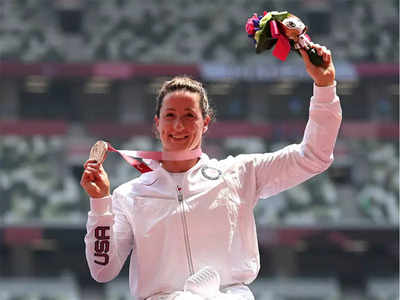
In September, McFadden returned home from the Tokyo 2020 Paralympics having added a gold, silver, and bronze medal to her collection, as well as setting a new world record with her universal relay team for the 4×100 meter event.
But preparing for Tokyo didn’t go as planned–in 2017, McFadden was diagnosed with a blood clotting disorder that caused many health problems.
The blood clots caused severe lymphedema, a condition that caused major swelling in McFadden’s legs and blood vessels. She had multiple surgeries to try to break up the clots, but they were unsuccessful. Finally, her blood clots started to go away after many attempts of different therapies to get rid of them. The recovery process took about 20 months.
“It was a long, long recovery process, and there were a lot of races I couldn’t go to and races I couldn’t win, so I was really frustrated,” McFadden said.
The blood clots might have thrown a wrench in the works, but McFadden didn’t let it get to her.
“I think what makes people successful is their persistence and that they just keep going at it,” said McFadden. “[My recovery] was about staying persistent and consistent and doing everything I could possibly do to get back into that chair and restart training,”
Inspiring others through film
New to her career is filmmaking. Recently, McFadden executive produced a 2020 Netflix documentary showcasing the Paralympics.
The documentary is entitled Rising Phoenix, and it won two Sports Emmy Awards in the ‘Outstanding Music Direction’ and ‘Outstanding Long Sports Documentary’ categories.
“I had an image of the way I wanted this film to be shown and perceived about how people with disabilities, because in my generation, I feel like people have a way that they see people with disabilities,” said McFadden. “I wanted to smash those stereotypes,”
And smash those stereotypes she did. Rotten Tomatoes gave the film an 86%, and many reviewers have commented that the film was outstanding. One reviewer, Jeffrey Sanzel, published a review on TBR News Media echoing this thought.
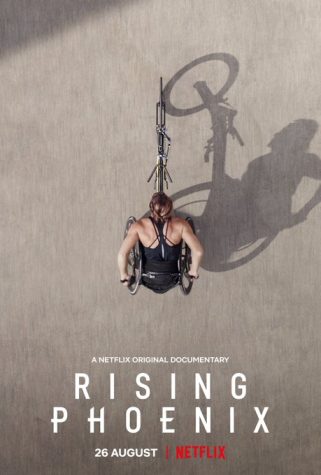
“The new Netflix documentary Rising Phoenix is a poignantly heartfelt and honest look at the Paralympics.” said Sanzel. “…Rising Phoenix more than just pays tribute to an important world event. It shares the faces and the voices of people who truly understand the intersection of diversity and excellence,”
The film covered the history of the Paralympics and the individual stories of nine elite Paralympians. McFadden thought the documentary was a great way to showcase the Paralympics.
“No one wants to read a thousand-page novel on the history of the Paralympics,” said McFadden. “That’s why we wanted to create this film, to show the world what it was about–what the Paralympics are about, what disabilities are about, and it’s a fun way of teaching people,”
McFadden also hosted a Zoom call with some of the people that worked on the film with her, one of which included Prince Harry, Duke of Sussex. In the interview, he shared that he loved working on the film and that it was an amazing experience for him.
“I love sports, and this is one of the most amazing projects that I’ve ever been a part of,” said Prince Harry.
Even though she has accomplished so much in her career so far, McFadden always remains humble.
“Life isn’t about what you don’t have, it’s about what you do with the gifts that you’re given. We spend so much time comparing, and we shouldn’t do that. We should use the gifts that we have and not compare one another,” said McFadden. “Try new things, be open minded, and be really excited, because a lot of good things will happen,”
Your donation will support the student journalists of Linganore High School. Your contribution will allow us to purchase camera/recording equipment and software. We hope to raise enough money to re-start a monthly printed issue of our paper.



